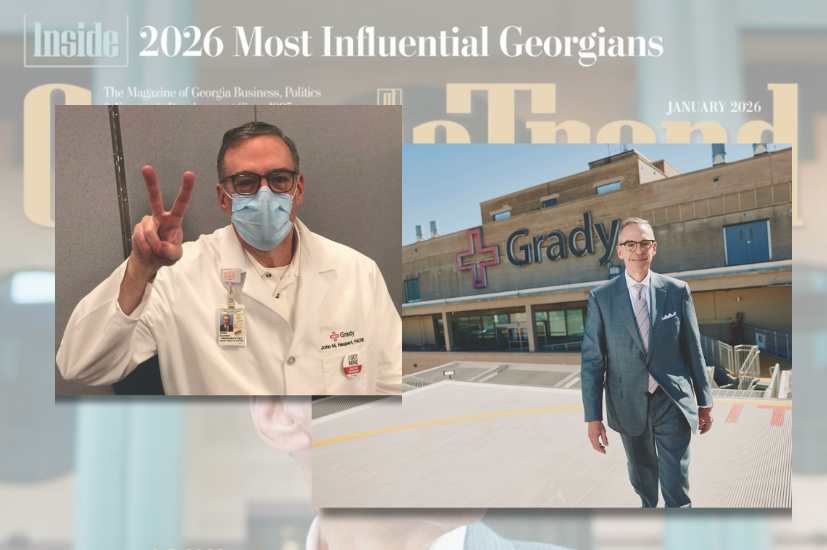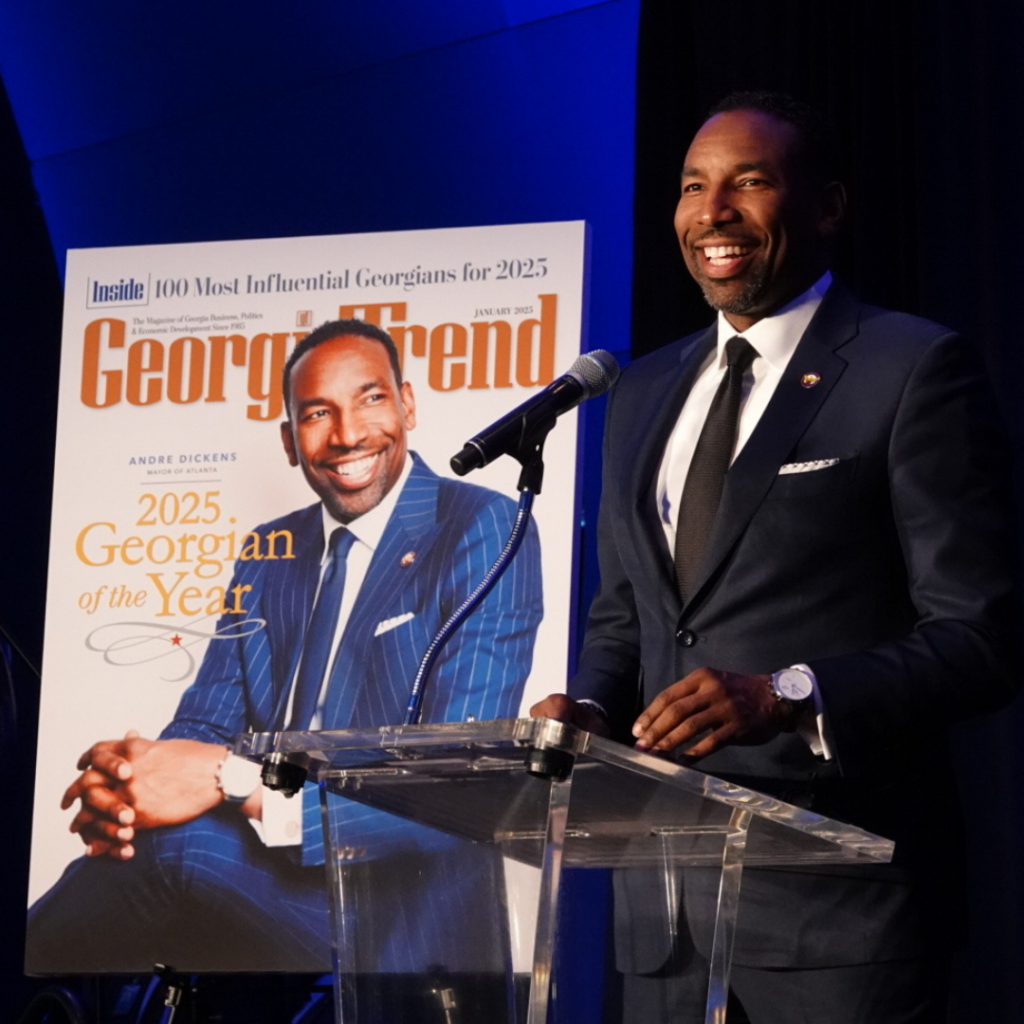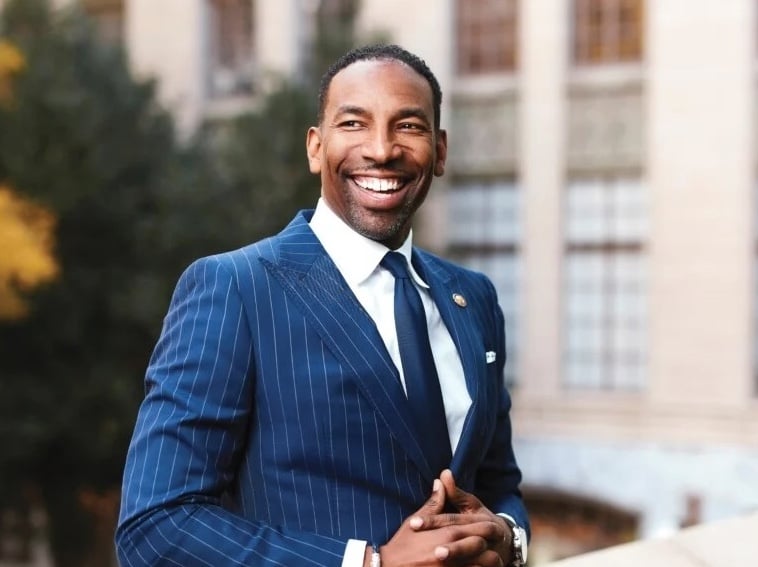2025 Georgian of the Year | Andre Dickens, Mayor of Atlanta
Mayor Andre Dickens’ strong work ethic, perseverance and a can-do attitude have propelled him to the top.
It was the job he always wanted – but first there was a hurdle to get over. No problem for the Georgia Tech grad who approaches every challenge with an engineer’s mindset. Still, when Andre Dickens won the runoff for mayor of Atlanta in 2021, it was an improbable finish that saw him leap from finishing a distant second in the general election to achieving a landslide victory in the runoff just 28 days later.
“I’ve won every race I’ve been in because I work very, very hard,” says Atlanta’s 61st mayor. “I do not stop until the job is done. I outwork everybody.”
Now Dickens, who turned 50 last June, is a popular mayor three years into his first term who seems unlikely to draw any serious opposition for reelection this year. He’s weathered challenges that have ranged from bitter opposition to the city’s new police and fire training center (dubbed “Cop City” by opponents) to anger over crumbling infrastructure and water main breaks that caused major disruptions in Downtown and other parts of the city last summer. Like the city he leads, he’s confident, energetic and highly visible, attending countless events and speaking at a fair number of them.
For his successful leadership of Georgia’s capital city – also known as the city that influences everything – Andre Dickens is Georgia Trend’s Georgian of the Year.
“I Want to Be that Guy”
Dickens’ political bio starts at the age of 16, when he said he wanted to be mayor of Atlanta, partly because he watched then-Mayor Andrew Young “talking about [making Atlanta an international city] every day on the news, or all the time he was giving speeches,” Dickens says. “He was always talking big and taking trips and coming back with show-and-tell. And I was just like, ‘Hey, I’m all in. I want to be the mayor. I want to be that guy.’”
But the seeds of that desire involve another Atlanta institution: MARTA. Dickens, a fourth-generation Atlantan, grew up in Adamsville, a neighborhood in West Atlanta where I-20 and I-285 intersect. He remembers Atlanta being a growing city, but not an international one. In addition to school and after-school sports (baseball or basketball, through parks and recreation programs) and church on Sundays, “I did everything the city had to offer,” he says. “I rode MARTA a lot with my sister and aunts. That’s how we would go downtown. I’d go to Underground Atlanta, Lenox Mall, Little Five Points … West End Mall or Greenbriar Mall. … I rode the Pink Pig at Rich’s.” School field trips included visits to the Center for Puppetry Arts, the zoo, the symphony. Dickens excelled at baseball and played with his parks-and-rec team all over the city.

Proud Alum: Mayor Andre Dickens, who graduated from Georgia Tech in 1998, spoke at the school’s spring 2022 commencement ceremony. Photo credit: contributed
It was, in some ways, like the perfect prep for being mayor. But there were parts of Atlanta he didn’t experience. “There were places we did not go and I did not understand,” Dickens says. “I didn’t go inside of many people’s houses. I didn’t know how Buckhead folks lived, I didn’t know Virginia-Highland, I really didn’t know how even some of the Black folks in Vine City or Thomasville Heights lived. But I knew a lot of the iconic places.”
And, he adds, “We were working class, single mother with two kids. If it wasn’t free or provided by somebody, we didn’t go.”
What Tech Taught
Dickens was smart (Beta Club at Benjamin Mays High School), popular (homecoming king) and already determined – characteristics that served him well when he attended Georgia Tech on a HOPE Scholarship (the first year it was implemented), majoring in chemical engineering. “One of the hardest majors there at the time,” he says. What HOPE didn’t pay for he covered with student loans and a co-op program, alternating attending school for one term and then working the next term. It took him six years to graduate.

Home Field Advantage: Attending Georgia Tech was such a formative experience for Dickens that he held his 2022 swearing in at Bobby Dodd Stadium. Photo credit: contributed
Attending Tech was a formative experience that Dickens says gave him his characteristic confidence – indeed the school plays such a role in his life that he was sworn in as mayor on the field of Bobby Dodd Stadium. “Tech prepared me because it was rigorous and I did not give up,” he says. “There is literally never a day, even sitting in the mayor’s seat, that I’m like, ‘This is bigger than we can manage; the problem is too hard to solve.’”
Dickens was president of Kappa Alpha Psi, president of the African American Student Union and the student government rep for chemical engineering – experiences that taught him “how to support a constituency.” It is also where he “learned to speak truth to power,” first approaching issues with an engineer’s mindset: Account for all the variables and try to solve the problem. “Somebody would have a problem … and I’d be like, ‘Well, why don’t we call the dean or the president or the vice chair?’ [Students would say] ‘They ain’t going to listen to us.’ Well, let’s try. We all pay tuition. We’re going to call them. And we would get what we wanted, or get an answer, at least.
“It has to be a goal of all of ours to move people from poverty to prosperity and from struggle to success.” Atlanta Mayor Andre Dickens
“That prepared me to be an advocate on behalf of people, to understand that power actually does want to hear how things are going.”
After graduating, Dickens worked as a chemical engineer and in chemical sales, then cofounded a home furnishings business. He returned to Tech as assistant director of outreach initiatives for the school’s Office of Institute Diversity, then became chief development officer for TechBridge, a nonprofit that provides technology consulting and outsourcing for other nonprofits. While working at Tech, he decided to get a master’s degree in public administration from Georgia State University. “I said, ‘I want to run for office, I need to know how to do it,’” Dickens says. “I’m a technical person. So I went to get a master’s in public administration so I understood the nuts and bolts of government.”

Man of Tomorrow: Dickens dressed as Superman on Halloween 2024 and gave candy to trick-or-treaters. Photo credit: contributed
His first race, in 2013, was for an at-large City Council post against a long-time incumbent. He remembers calling his childhood friend, the late Cabral Franklin, son of former Mayor Shirley Franklin and a highly respected and influential political adviser in Georgia, who helped him put together a team for the race.
“I ran on pretty much the same platform I have now,” he says – public safety, affordable housing, good-paying jobs and better education. “People liked it.” That, combined with his “outwork everybody” approach, won him the seat, which he kept until entering the mayoral race in 2021.
Addressing Atlanta’s Challenges
If it’s a platform and an approach he’s kept as mayor – Dickens sometimes seems to be everywhere in the city and says he will always “go to more forums or meetings or debates” than his political opponents – there’s no question that leading the city is a much bigger job. As Atlanta has grown rapidly, lack of affordable housing has become a critical issue. Dickens points out that he’s “been beating that drum” for over a decade, not only about the need in the city of Atlanta proper but also in the Metro and across the state.
“I saw, even before I became an elected official, we were becoming a victim of our success,” he says. “The city was growing and thriving, [but] we could end up being San Francisco where you have this amazing growth, but you lose the middle class, and you lose the ability for people to live there.”
During his campaign, he promised to create or preserve 20,000 units for affordable housing by 2030. “We’re well on our way,” he says. “We have 6,000 units completed with people living in them, and nearly 4,000 units are under construction or fully funded and ready for construction to start. So we’re about halfway to our goal. We have line of sight to the rest of it, and we’re pushing.”
“There is literally never a day, even sitting in the mayor’s seat, that I’m like, ‘This is bigger than we can manage; the problem is too hard to solve.” Atlanta Mayor Andre Dickens
He established an affordable housing strike force in 2022 to pull together various agencies and entities in the city to find vacant land or abandoned properties where those units could be built. A year later, he spurred the creation of the Housing Help Center, a hotline and website that’s a one-stop shop to help people find resources, from help paying rent to downpayment assistance for first-time homebuyers to programs that help with owner-occupied rehab of housing. “You just don’t know where to find all this stuff,” Dickens says. Hotline operators are essentially navigators, he says, who can point people to the right resource. “Some of them are our programs, some of them are federal programs,” he says. “Sometimes it’s even nonprofits which [can help with] utility payments. We’re very proud of that.”
Dickens won’t argue with critics who say 20,000 units aren’t enough. “[It’s] a big number, but it’s still not enough,” he says. “I want to see the whole state take this seriously. We can’t build a new battery plant and not have housing. We can’t build a new automotive plant or any kind of industry that is going to require all these jobs, but yet you don’t have housing for people.”
In addition to the push for more affordable housing, Dickens announced a proposal for $60 million in funding to help address homelessness, the largest single investment to help unhoused people in city history. The proposal includes a $50 million bond and $10 million from Atlanta’s affordable housing trust fund and envisions additional private funding that would push the total to $120 million or more. It would create 700 units of housing with the support services needed for people making the transition from homelessness to housing.
Both housing issues exist alongside another problem – income inequality. Atlanta routinely ranks as the worst city in the U.S. for income inequality. A 2024 report by GOBankingRates.com found that the top 20% of Atlanta residents earn an average of $384,230 while the bottom 20% earn an average of $11,221.

Fighting Blight: Dickens with his senior adviser Courtney English, below left, and Westside Future Fund president and CEO John Ahmann, second from right, in front of a Vine City home that was transformed. Photo credit: Josh Spuiel, City of Atlanta, Ofice of Mayor.
“It has to be a goal of all of ours to move people from poverty to prosperity and from struggle to success,” Dickens says. Combatting inequality is a “group project,” he says, and he established a policy team, led by his senior adviser Courtney English, to address equity in five areas: affordable housing, youth development, education, economic mobility and neighborhood empowerment. He also created an Atlanta Department of Labor and Employment Services to help match residents looking for employment with job openings.
“The city has so many residents that don’t know what the opportunities are, and the businesses don’t always … hire locally,” he says. “I was not pleased when new companies came here, announced that [they’re] going to have a thousand jobs, and then they imported all their talent from wherever they came from, because those jobs could be locally sourced.”
The Atlanta Model
The need for workforce development led Dickens to create his signature summer youth employment program in 2022. It matched 157 employers with more than 5,000 young people who made an average hourly wage of more than $17 in 2023. “Youth crime went down, and these kids had an amazing summer,” Dickens says. “They worked for a company or they worked for the city. [In] 2024, we did it all over again. Same result – another 5,000-plus kids worked. Now they got some money in their pocket, and they got the taste of what it’s like to work and to have the freedom to pay for stuff.”

Taking Pride in Work: Dickens, center back, celebrates the 2024 summer youth employment program, which matched 5,000 young people with more than 150 employers including Accenture Atlanta Innovation Hub. Photo credit: contributed
Another group project is dear to his heart – transit. You can hear echoes of the kid who rode MARTA everywhere when Dickens says that the transit system is crucial to Atlanta growing in a balanced way. “MARTA can help us connect people to opportunity,” he says. It can also be part of the housing solution, with transit-oriented development at MARTA stations.
In 2024, Dickens announced four new MARTA infill stations to be added to the existing network, along the Beltline’s Westside Trail, at Krog Street, at Armour Yards, and along Joseph E. Boone Boulevard. “Also, I want MARTA or some transit to be in various suburbs,” he says. “I want it to be everywhere.”
The group project approach led Dickens to be more active than recent mayors in the Atlanta Regional Commission, the intergovernmental coordination agency for the Metro Atlanta region. In fact, he’s the current board chair, the first time an Atlanta mayor has served in that role.
Dickens notes that although the actual city of Atlanta is less than 10% of the Metro area in terms of land and population, the city swells with people coming in each day to work and to play. “Some people see the region as competition,” he says. “I don’t get bent out of shape about the growth of the region, of all the other counties. Atlanta is growing, too. … I think we can compete, if necessary, but I’d much rather we coordinate and collaborate.”
When Dickens won the Maynard H. Jackson Community Impact Award from 100 Black Men of Atlanta in 2024, the 50th anniversary of Jackson’s historic first inauguration as mayor, it had a particular significance. “Maynard Jackson is the North star for me – how to be a mayor that united people, set big goals and delivered on them, overcame obstacles [when] everything wasn’t rosy.”

Significant Honor: Dickens received the 2024 Maynard H. Jackson Community Impact Award from 100 Black Men of Atlanta in October. Pictured with him are Milton Jones, founding member of Peachtree Providence Partners Holding Company, left, and 100 Black Men of Atlanta Chair Sidney Barron, right. Photo contributed
As for his own legacy – though he notes it’s a bit premature to use that word, as he’s still in his first term – Dickens says he wants to be viewed as business-minded but community focused. “I think I will be viewed favorably as somebody who got the job done and helped as many people as possible. It’s not lost on me that the very same week we got a AAA credit rating was the week we authorized $60 million for homelessness,” he says.
“So a hundred years from now, somebody’s going to say, ‘We need to focus on homelessness.’ And somebody’s going to say, ‘We need to make sure the city runs well.’ And they’re going to think these are competing options. And I’m going to say, ‘no, no, no – y’all better turn back to 2024. Somebody pull up the city of Atlanta Almanac, the ATL bible, the chapter about Andre Dickens.’ And that chapter is going to say, we were able to run this thing like a business, with ethical government, and we served the homeless, the youth. We did it, and it was a model.”







